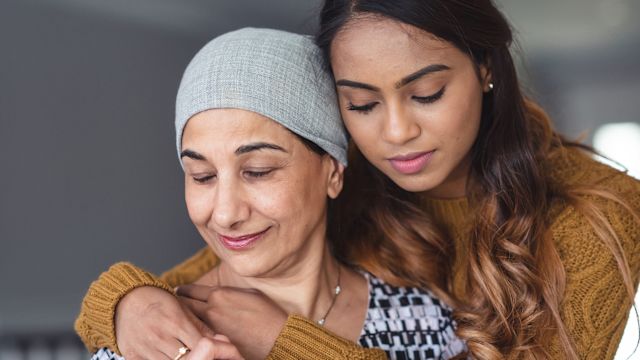Cancer has many possible causes, but sometimes it can be linked to changes in your genes, called gene mutations. Since genetic codes are inherited, the same mutation is often found among different family members. If you have a number of relatives with breast or ovarian cancer, a BRCA gene mutation could run in your family.
“Everyone has the BRCA1 and BRCA2 genes, but having a mutation on those gene lines increases your risk for breast and ovarian cancer,” says Darshna Chandrasekhara, MD, an OBGYN at Medical City Las Colinas in Irving, Texas.
People with the BRCA1 mutation have a 55 to 85 percent lifetime risk of breast cancer and a 40 percent risk of ovarian cancer, says Dr. Chandrasekhara. With the BRCA2 mutation, you have a 45 to 70 percent lifetime risk of breast cancer and an 11 to 18 percent risk of ovarian cancer.
“Those numbers are shocking, but only 5 to 10 percent of people with breast cancer actually have the genetic type. That means people should only get tested if they’re truly at risk for the mutation,” she explains.
What are the BRCA genes?
Normally, the BRCA genes help prevent cancer. Cancer happens when a group of cells start growing too much or too quickly, but the BRCA genes keep your breast and ovarian cells from growing out of control.
If you have a BRCA gene mutation, you’re less protected, but you won’t necessarily develop cancer. That’s because you have two copies of each gene—one from your mother and one from your father. If there’s a mutation on one copy of a gene, the other one may still work.
However, if the working copy gets damaged, cancer could develop. Things that can harm a gene include:
- Tobacco
- Alcohol
- Exposure to radiation or certain chemicals
A poor diet and lack of exercise may also cause damage. In fact, about 20 percent of cancers in the US have been linked to preventable causes like these.
Should I get tested for BRCA gene mutations?
Your doctor may recommend genetic testing if you have a history of:
- Cancer in both breasts
- Breast and ovarian cancer affecting you or a close family member
- Two or more close relatives with breast or ovarian cancer, including men with breast cancer like a father, brother or son
- A relative with breast or ovarian cancer before menopause
- Eastern European Jewish ancestry
Since 2013, the US Preventive Services Task (USPSTF) has recommended that women with a family history of breast, ovarian, tubal or peritoneal cancer be screened by their doctor using a risk assessment tool, and that those determined to be at risk should then receive genetic counseling and testing. In August 2019 however, the Task Force expanded this recommendation to include women with a personal history of one of these cancers or an ancestry associated with BRCA gene mutations, including those of Ashkenazi Jewish descent.
“There are two ways to test for mutations," says Chandrasekhara. "You can have a blood test or you can have your cheek cells tested. For the cheek test, you’ll swish around mouthwash and then spit it into a cup,” she explains. After that, a lab will filter out your cheek cells and break them down to complete the genetic testing.
What to do if you test positive
If you learn you’re a mutation carrier, work with your OBGYN to decide how often you’ll need to complete screenings for breast cancer, such as:
- Clinical breast exams. These are typically done twice a year starting around age 25.
- Magnetic resonance imaging (MRI). “Annual breast MRIs are recommended between ages 25 to 29 because mammograms aren’t usually helpful in younger people,” says Chandrasekhara. “Younger breasts can be very dense, so mammograms aren’t able to pick up on changes as easily.”
- Mammograms. An annual mammogram and an annual breast MRI are both recommended from ages 30 to 75, according to the National Institute of Health.
There are screening tests available for ovarian cancer as well, but these tests aren’t always reliable. You and your healthcare provider should discuss whether ovarian cancer screening is right for you.
How to lower your cancer risk
Along with a careful screening schedule, you can lower your risk by:
- Breastfeeding. Twelve months of cumulative breastfeeding—even if it’s from different pregnancies—adds up to lower your risk of breast cancer,” says Chandrasekhara. Plus, pregnancy in general may lower your risk of ovarian cancer.
- Maintaining a healthy weight. A body mass index (BMI) over 30 raises cancer risk.
- Avoiding alcohol and tobacco. Find an addiction specialist near you or make a plan to quit tobacco.
Some people also undergo preventive chemotherapy or operations to keep cancer from developing. For example, a bilateral mastectomy reduces your breast cancer risk by 90 percent, says Chandrasekhara. The choice to have preventive chemotherapy or surgery should be based on your age, mutation type and desire to start a family.
If you have a strong family history of breast or ovarian cancer, ask your doctor if you’re a candidate for genetic testing at your next appointment.


